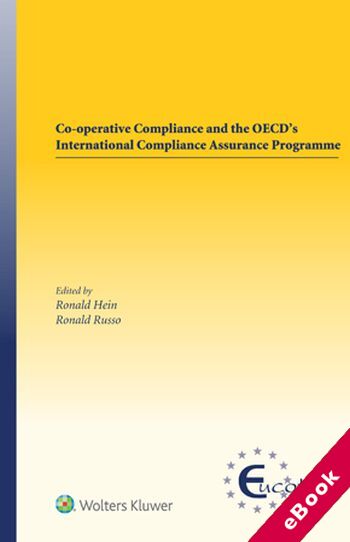
The device(s) you use to access the eBook content must be authorized with an Adobe ID before you download the product otherwise it will fail to register correctly.
For further information see https://www.wildy.com/ebook-formats
Once the order is confirmed an automated e-mail will be sent to you to allow you to download the eBook.
All eBooks are supplied firm sale and cannot be returned. If you believe there is a fault with your eBook then contact us on ebooks@wildy.com and we will help in resolving the issue. This does not affect your statutory rights.
Co-operative Compliance and the OECD’s International Compliance Assurance Programme is the first publication to analyse Co-operative Compliance and the International Compliance Assurance Programme (ICAP) in twelve different jurisdictions. Prominent among initiatives addressing the urgent need for a common understanding between multinational enterprises (MNEs) and national tax authorities about risks and risk assessment is the ICAP, which provides a channel for MNEs to engage in simultaneous discussions with multiple national tax administrations, thus enhancing the potential for advance tax assurance. To a certain extent, the ICAP represents the internationalization of Co-operative Compliance frameworks which were, until then, restricted within the borders of single jurisdiction.
What’s in this book:
Following a general introduction, the book presents two opening perspectives on the ICAP, one from the OECD and the other from a participating tax administration (the Netherlands), leading to the twelve country reports and a special chapter on transfer pricing, which is the main issue in international tax disputes. Specific elements reviewed include the following:
Each report addresses the same questions so that all the reports cover, to some extent, the same features of their domestic relationship approaches and their ICAP experiences. A final chapter puts forward the reviews on the contributions and offers some concluding remarks.
How this will help you:
Although the ICAP process probably will undergo further adjustments, it is certain that the road to more international cooperation between tax authorities and MNEs is now open. This timely book, as a comparative review of the implementation of the ICAP among leading jurisdictions active in global trade, provides matchless insights into trends, similarities, differences and their implications. With country reports contributed by tax academics and professionals experienced in dealing with Co-operative Compliance and the ICAP, this book will be welcomed by all stakeholders in the international tax community, including lawyers, taxation authorities and academics.